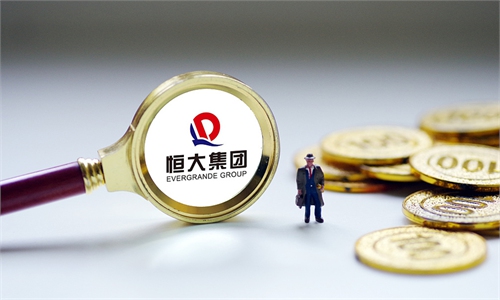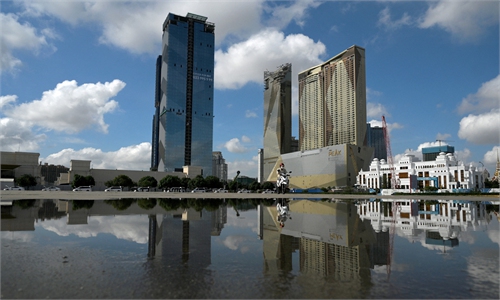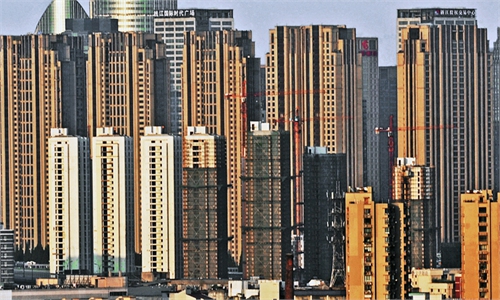China's new home prices rise in January, as efforts to boost real estate sales pay off
Policies and efforts to boost real estate sales pay off in China

Residents select houses at a sales center of a real estate company in Huaian, East China's Jiangsu Province on Sunday. As China's domestic coronavirus control has made progress, local real estate companies have opened while observing strict measures against the virus. Photo: cnsphotos
Chinese consumers' confidence in the domestic property market was sharply impacted after the unmasking of Evergrande's debt woes. As both the government and lenders implement measures to boost property sales, China's new home prices in January recorded a month-on-month increase for the first time since September 2021, official data revealed on Monday.
Analysts said that the January data of housing prices is a positive sign that a steep decline in the real estate sector is beginning to be curbed after proactive and appropriate policy adjustments in the fourth quarter of 2021 were put in place, especially financial and credit policies.
Sheng Guoqing, chief statistician from the urban department of China's National Bureau of Statistics (NBS), said that in January new home prices in China's first-tier cities reversed a month-on-month decline of 0.1 percent in December, recording an increase of 0.6 percent, of which Beijing rose 1 percent and Shanghai rose 0.6 percent.
Prices for secondhand homes increased 0.1 percent in January from December, with Beijing and Shanghai rising 0.5 percent and 0.6 percent, respectively, Sheng said.
According to the NBS, among the 70 large and medium-sized cities, 39 saw new homes prices fall in January, 11 fewer than last month; while 55 cities recorded a price drop for secondhand homes, eight fewer than December.
"This reflects that the government's stimulus policies in the fourth quarter of last year, especially easier mortgage policy, have worked to curb the decline of house prices," Yan Yuejin, research director at Shanghai-based E-house China R&D Institute, told the Global Times on Monday.
Since September, China's property market has faced downward pressure, resulting from debt defaults by heavily-indebted property developer Evergrande Group and other developers, triggering public concern over market conditions.
New policies
In order to stabilize the property market, regulators have implemented a series of measures to ease financing restraints including accelerating mergers and acquisitions among debt-burdened real estate developers.
China's central bank moved to cut the one-year benchmark loan prime rate (LPR) on December 20 after releasing 1 trillion yuan ($158.05 billion) in extra liquidity into the country's financial system.
During the Spring Festival holidays, some Chinese cities moved to reduce down payment requirements to kindle demand.
Real estate agencies in Southwest China's Chongqing Municipality claimed that a number of local banks have reduced the down payment ratio for home loans to 20 percent for buyers with no mortgage history during the Spring Festival, following a similar cut for the down payment ratio for home loans in Heze, East China's Shandong Province and Ganzhou, East China's Jiangxi Province.
"NBS' data, together with local banks' recent performance points toward an easing of mortgage policies, which will largely lower the threshold for home purchases, helping activate property market transactions," Yan said.
The latest governmental policy was from China's top economic planner - the National Development and Reform Commission (NDRC) on Friday.
New preferential tax and fiscal policies are designed to support real estate enterprises, according to a notice by the NDRC aiming to promote the steady growth of industrial economy through various policies.
China will increase pre-tax deductions for equipment purchases made by micro-, small- and medium-sized enterprises (MSMEs), which include real estate enterprises with an operating income of less than 2 billion yuan or with total assets of less than 100 million yuan.
"In the past, the favorable policies for MSMEs hardly mention real estate enterprises. It marks a policy direction change. The tax reduction policy of equipment and appliances is related to the investment in land and new construction of houses, which will reduce investment pressure in the next round," said Yan.
Yan also said that the NDRC standard will actually cover nearly all real estate enterprises that are not ranked in the top 100 domestically, as most of the property developers generate below 2 billion yuan in revenue.
From Monday onwards, China's four top banks, including People's Bank of China and Industrial and Commercial Bank of China, started to lower the housing loan interest rate for first-time home buyers in Guangzhou, South China's Guangdong Province.
Future of real estate
Analysts said that compared with the strong market demand and tight mortgage environment seen during the same period last year, in 2022, new home loan applications are expected to cool down for at least the time being.
Benefiting from the regulatory protection on reasonable demand, real estate financing will show marginal signs of recovery, but the confidence of home buyers and investment confidence of real estate enterprises urgently need to be boosted, according to a report by Ping An Securities published on Monday.
The financing of housing enterprises improved on a monthly basis. However, the increment of medium- and long-term household loans in February is 227.2 billion yuan less than the same period in 2021, which also reflects the lack of willingness of buyers to enter the market, per Ping An Securities.
Real estate industry has traditionally been an important driving force of economic growth in China. But its prevalence slowed in 2021, especially in the fourth quarter, following policy efforts to reduce leverage in the property sector.
The contribution of real estate sector to GDP in 2022 is expected to remain at 6.78 percent of 2021 levels, Dong Dengxin, director of the Finance and Securities Institute at the Wuhan University of Science and Technology, told the Global Times on Monday.
But Wu Chaoming, chief economist at Chasing Securities, is more cautious over forecasting the contribution.
"Real estate investment and sales are likely to turn from negative to positive annual growth by mid-year taking an optimistic view. Even so, real estate will contribute only a small amount to whole-of-year GDP," Wu told the Global Times.
And analysts said that consumer spending will be a new and major driving force for the economic growth.
"To achieve stable growth, the traditional drivers - real estate and infrastructure - may contribute, but I don't think they will return to being the main drivers of China's economic growth," Wang Dan, chief economist of Hang Seng Bank (China), told the Global Times.
In 2021, consumption spending contributed 65.4 percent to China's economy and contributed 5.3 percentage points to GDP growth, said NBS. China's consumer spending as a share of GDP averaged 53.3 percent between 2011 and 2020.
Analysts said that the contribution of consumption to economic growth will likely increase in 2022, as there is huge pent-up potential.
While many challenges faced by China have no easy answer, the key message of IMF's annual Article IV review of the economy released in January is that rebalancing toward a more consumption-based model will boost growth prospects in the short term and deliver high-quality expansion in the long run.



